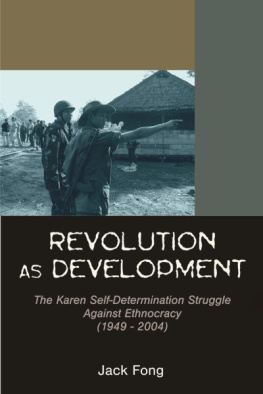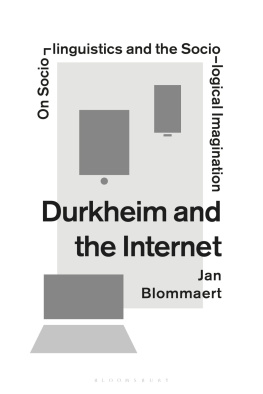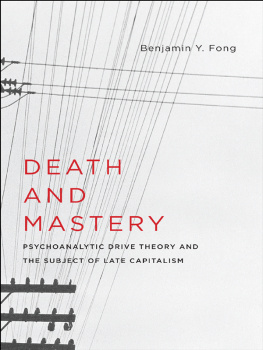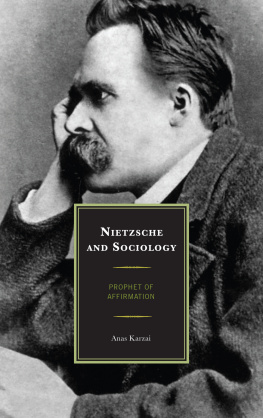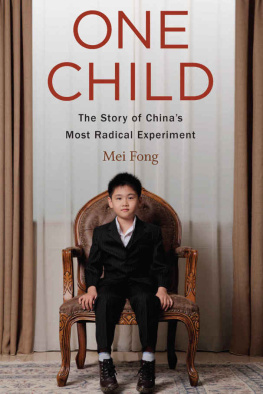Jack Fong - Employing Nietzsche’s Sociological Imagination
Here you can read online Jack Fong - Employing Nietzsche’s Sociological Imagination full text of the book (entire story) in english for free. Download pdf and epub, get meaning, cover and reviews about this ebook. year: 2020, publisher: Lexington Books, genre: Science. Description of the work, (preface) as well as reviews are available. Best literature library LitArk.com created for fans of good reading and offers a wide selection of genres:
Romance novel
Science fiction
Adventure
Detective
Science
History
Home and family
Prose
Art
Politics
Computer
Non-fiction
Religion
Business
Children
Humor
Choose a favorite category and find really read worthwhile books. Enjoy immersion in the world of imagination, feel the emotions of the characters or learn something new for yourself, make an fascinating discovery.

Employing Nietzsche’s Sociological Imagination: summary, description and annotation
We offer to read an annotation, description, summary or preface (depends on what the author of the book "Employing Nietzsche’s Sociological Imagination" wrote himself). If you haven't found the necessary information about the book — write in the comments, we will try to find it.
Jack Fong: author's other books
Who wrote Employing Nietzsche’s Sociological Imagination? Find out the surname, the name of the author of the book and a list of all author's works by series.
Employing Nietzsche’s Sociological Imagination — read online for free the complete book (whole text) full work
Below is the text of the book, divided by pages. System saving the place of the last page read, allows you to conveniently read the book "Employing Nietzsche’s Sociological Imagination" online for free, without having to search again every time where you left off. Put a bookmark, and you can go to the page where you finished reading at any time.
Font size:
Interval:
Bookmark:
Jack Fong is a political/urban sociologist who has long appreciated integrating philosophy with the discipline of sociology. With works such as the Death Caf Movement: Exploring the Horizons of Mortality, as well as Revolution as Development: The Karen Self-Determination Struggle against Ethnocracy (19492004), along with other publications related to solitude, nationalism, social movements, and urban problems, Fongs orientation toward living by first confronting all forms of mortality, whether community or state-related, have generated much favorable community response. In his current work harnessing the sociological insights of the great German philosopher Friedrich Nietzsche, Fong offers a unique rereading of Nietzsche in ways that synchronize the ideas of one of philosophys greats with the complex social dynamics of the human condition in the modernities of the twentieth and twenty-first centuries.
When one decides to write a book about the ideas of a brilliant yet subversive thinker a network of supporters greatly enhances the undertaking. In this regard, I am eternally grateful for the wonderful insights offered by Dr. Kevin McCaffrey with whom I communicated frequently a variety of Nietzschean themes. I also express my gratitude to sociologists Drs. John Moss, Anjana Narayan, Steve Nava, Piyasuda Pangsapa, Christine Payne, Michael Roberts, and Anthony Villareal. All of you have heard about the content of this monograph in more ways than one and I am grateful. My gratitude also extends to Dr. Gabriele Plickert who has been instrumental in ensuring that I accurately convey the semantics of different German expressions. Dr. John Brown Childs, a deep soul and a great friend, is also much deserving of my gratefulness. His notion of a shared humanity through the ideas of transcommunality underpin the important ethos that members of society should always engage in creating new communities of dignity and respect.
I am also grateful to Drs. Maudemarie Clark and Julian Young for being wonderful sources of inspiration. Drs. Patrik Aspers and Anas Karzai have also been supportive of this effort and are wholeheartedly deserving of my gratitude. All of your analyses and accounts of Nietzsche have been influential in generating a variety of cues about how to approach his philosophy as a sociologist. I also express much appreciation and gratitude to Lexington Books excellent editors Courtney Morales and Shelby Russell for ensuring a smooth publishing process. This work is also inspired by former friends, colleagues, mentors, and wonderful people who have now left us: my father Leo S. W. Fong, Drs. Dilip Basu, Ben Crow, Fouad Kalouche, and Wally Goldfrank. I express my heartfelt thanks to all of you.
A warm thank you must also be directed to John Ambrose, MDan admirer of Nietzschefor granting me the rights to use his 2017 oil painting of our philosopher for the cover. The abyss our philosopher stares into is hauntingly captured in an evocative and uncluttered scene, perhaps not unlike the solitary evenings in Sils Maria when Nietzsche engaged with his existence, our existencehumanitys existence. Finally, I thank my spouse Thasanee and my son Pattarakorn: without the patience and support from both of you, this work would not have materialized.
Nietzsches sociologically oriented observations are rarely considered because of his iconic status as a philosopher. In this chapter, I hope to highlight Nietzsches contribution to sociology, with assistance from American sociologist C. Wright Mills who originated the term the sociological imagination. Through Mills, this chapter adopts the view that Nietzsche is an important social theorist with a prescient sociological imagination.
Rendering Nietzsche as a social thinker with an insightful sociological imagination would not have been possible were it not for C. Wright Mills (19161962), American sociologist born 72 years after Nietzsche. Mills coined the term in his eponymous 1959 classic as a means for highlighting for sociology broader panoramas that tied the self to different contexts and periods of social life. By illuminating the actors connections to these contexts, a biography tied to historical currents emerges to effectively frame the agency and human condition of the actor.
Mills, in many ways, paralleled Nietzsche in the way the former viewed knowledge production and agency. Although Nietzsche is well known for launching his critique against the grand sociologists of his day, specifically Auguste Comte and Herbert Spencer, Mills was similarly critical of his contemporaries, such as the important theorist Talcott Parsons, and of grand theories in general, all of which are drunk on syntax, blind to semantics (1959, 18). I am of the view that Millss and Nietzsches personae were quite similar as well. Both were provocative and subversive thinkers in their respective time periods. Like Nietzsche, Mills distilled social dynamics about power and empowerment in a highly critical manner. Both thinkers ceased knowledge production at approximately the same age: by age 45 in 1889, Nietzsche had suffered a mental collapse that would relegate him a virtual invalid for the next eleven years until his death in 1900 at 55, enabling his sister, Elisabeth Frster-Nietzsche, as we shall elaborate later, to care for him, placing her close to his notes and unpublished materials. The available access allowed Elisabeth the capacity to transform her brothers philosophy into a narrative that promoted Nazi ideology. Mills himself died at the age of 45 after suffering complications from his alcoholism and fourth heart attack.
Up until his passing, Millss professional life was turbulent and combative. He was constantly at war according to George Ritzer, having fought with and against everyone and everything (1992, 211). Irving Horowitz notes how contemporary sociology theorist Hans Gerth described the young Mills as an excellent operator, whippersnapper, a promising young man on the make, and a Texas cowboy a la ride and shoot (1983, 72). Millss combativeness surfaced during his doctoral studies when he was in his mid-twenties, approximately the same time a disillusioned Nietzsche had served as chair of Classical Philology at the University of Basel. In the case of Mills:
Beginning in graduate school, he attacked the professors in his department, and later in his career he took on senior theorists in that department (calling one a real fool), leaders of American sociological theory (such as Parsons), and the dominant survey research methods (and methodologists) in the field. Eventually he came to be estranged and isolated from his colleagues at Columbia University. Mills said of himself: I am an outlander... down deep and good. (Ritzer and Stepnisky 2013, 94)
Ritzer was not too charitable toward Mills who he felt was not a great neo-Marxian theorist (he made no original contributions of his own to the theory) (2013, 94). However, Ritzer concedes that Mills was a great critic of American society (and of American sociological theory, especially the theorizing of Talcott Parsons) (2013, 94). Mills was not only intellectually radical but personally radical as well. Like Nietzsche, Mills refused to play the academic game according to the gentlemanly rules of the day (Ritzer and Stepnisky 2013, 94). Another uncanny similarity between Millss and Nietzsches experiences within their respective lifetimes was how the former was always at with odds with people; he was also at odds with American society and challenged it on a variety of fronts (1992, 211), not unlike Nietzsches view of the German culture of his day being reproduced by poseurs of learning, what he termed cultural philistines, against whom Nietzsches philosophy agitated. And like Nietzsche, Mills took no prisoners and harbored no favoritism to creed:
Font size:
Interval:
Bookmark:
Similar books «Employing Nietzsche’s Sociological Imagination»
Look at similar books to Employing Nietzsche’s Sociological Imagination. We have selected literature similar in name and meaning in the hope of providing readers with more options to find new, interesting, not yet read works.
Discussion, reviews of the book Employing Nietzsche’s Sociological Imagination and just readers' own opinions. Leave your comments, write what you think about the work, its meaning or the main characters. Specify what exactly you liked and what you didn't like, and why you think so.

